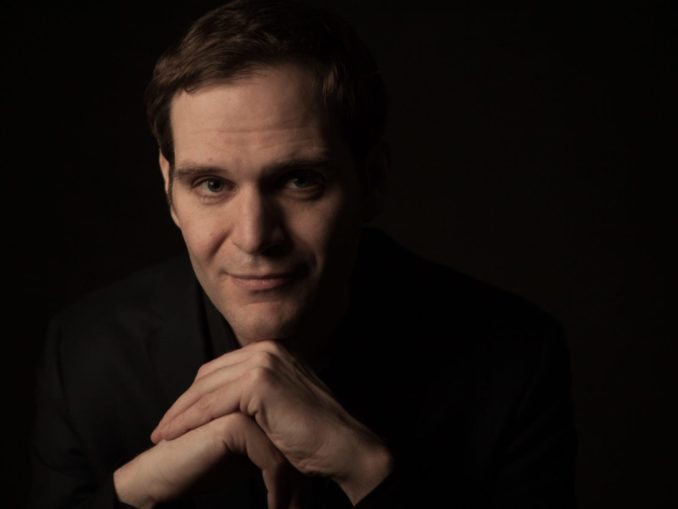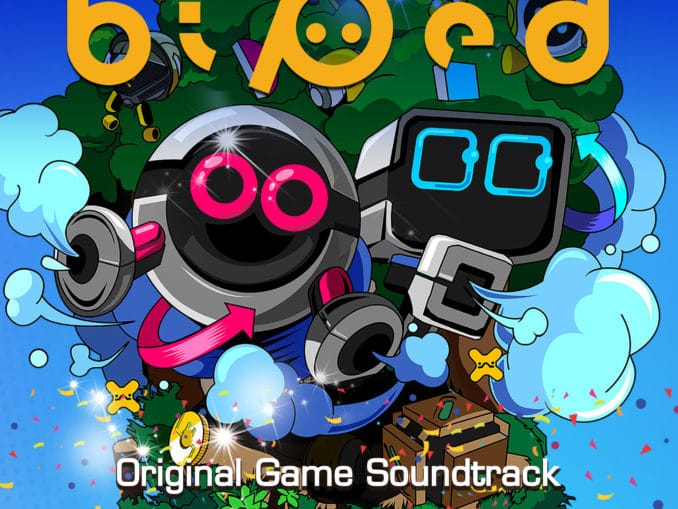
Looking for a new game to play during this time at home? If you are a fan of coop adventure games, NExT Studios’ Biped is worth checking out.
About Biped
Biped is a coop action game with physics. Take Aku and Sila on a fun and bonding adventure, overcoming original challenges and saving Earth from going dark. The title supports both local 2 player coop and solo play and features 30 exotic stages to explore.
Biped is filled with vibrant colors and beautiful imagery with an original score by Thomas Parisch to match these visuals.

Biped’s score by Thomas Parisch
For the Biped score, Parisch focused on combining both electronic synth sounds with acoustic, unplugged elements coming from a more world music background. In the below exclusive interview with NintendoReporters Parisch discusses this and many more topics.
- How did you first get connected with Biped? What was your initial appeal to the project?
I got first connected to Biped back in June 2018. Yang Jie, who I had worked with on several projects before, was the audio director of the game at that time. He reached out to me about this new title about two robots needing to work together and it quickly sparked my interest.
Having worked on several epic games with heavy dramatic storylines I was looking for a change of pace and a new challenge. I loved the playful, lighthearted nature of Biped, the idea of the co-op gameplay and the overall cuteness in the design. Although I didn’t know exactly where it would take me musically, I really wanted to work on it. Now I can say that the project’s creative journey didn’t disappoint…
- What sort of musical direction did NExT Studios give you for the Biped score?
The directions changed over the course of the project a bit. At first, we tried a more acoustic sound, less electronic, almost naïve tribal sort of. Another idea was to improvise the entire score with a small band. After trying those very initial ideas and with the project progressing more, the music direction became clearer.
Last year, with Zhang Xin as new audio director taking over the project, we focused on combining both the electronic synth sounds with the acoustic, unplugged elements coming from a more world music background. What stayed the same throughout the project however was the idea to convey the playful mood with a compositional style that is relying on improvisational. Just like the trial and error in the gameplay, we wanted to have a bit of childlike spontaneity in the score as well.
- How would you describe your score for the game?
I simply wanted the score to be the musical portrait of two cute little robots going on a mission exploring earth. I hope it is a fun, colorful soundtrack. Musically, it draws from various styles: electronic music to represent the robots and world music influences ranging from Latin to Indian, Celtic, country and others for different environments the journey takes us to.
Even though we have many themes that reappear in many variations throughout the score, the musical tapestries are woven together rather casually overall to mirror the spontaneity of the exploration in the gameplay. Many parts were not strictly written and got only fixed when performed. Not only the flutes, bass and percussion, but also many synth parts such as keyboards and electronic wind instruments are performed rather than programmed.
I hoped that would give the robots a bit of a human, relatable touch. Because even though they’re machines, they explore and learn about their environments, fail and succeed in a human way. With us as the players behind them, it was important for me to bestow the score with a bit of human imperfection and warmth.
- How long did it take you to create the Biped score?
It’s going to be 2 years soon since I started working on the project. But there were quite a few breaks in between, and long ones, too. If I were to take only the actual writing periods, I’d say altogether it took place over the course of a maybe four months. But the production process with recording and mixing added another complicated part adding another few weeks.
Then the project got delayed and I ended up touching up and revising some parts of the score. It also gave me the opportunity to extend and rework some pieces for the soundtrack. So, you see it’s quite difficult for me to say how long it took to create the score…
- What would you say was your most important job, as a composer, for this game? How do you know you have succeeded at that?
First of all, finding the right tone and palette for the combination of machine, alien protagonist in an organic, terrestrial setting was one of my most important jobs. Next, finding the right style to convey the fun, explorative nature of the game. These things are basically about how well integrated the score is into the overall experience.
We are always looking for an immersive experience, I think, so we need all aspects, even though adding unique aspects to the storytelling and drama, to be integrated as seamless as possible. Then, while trying to hit all these points, I also needed to keep it interesting, varied and changing enough throughout the game while still having it be cohesive with a recurring main theme and using a core of sounds.
If I have succeeded at all this is hard for me to say, I hope so though. It is hard to judge one’s own work always, especially when one has not yet had much distance, meaning time, from the period of creation, I think. If I can be at all, I might be a better judge of that in a few years looking back at the project. But in any case, the best judges of this will always be the gamers, which are ultimately the reviewers looking at it from the outside with a fresh look. You should check in with them…
- Do you have a favorite track from the game? For the people who have played, where is this track in the game?
Well, that’s a hard one. I don’t know how to pick just one, I sort of love all my children…. But… I definitely enjoy the title track a lot, “Biped Theme”. Even though the theme was written early on, the full fleshed out version I arranged in the end, so I could incorporate many elements that became vital to the score which was fun to do. It has this quirky, whimsical energy that is central to the score and both, the world music sounds with flute and dumbek drum, and also the signature synth sounds all wrapped into a funky, jazzy arrangement. I’m quite happy with it. You can find it at the starting cinematic.
Apart from that, I really enjoyed the more world music leaning tracks because of the amazing performances from Pedro Eustache, Zac Zinger, Brian Kilgor and Yon Lee. They all played amazing solos on various ethnic instruments. I like Pedro’s performance on “Jump!” which is one of my favorite tracks overall because of the funky jazzy energy and Pedro’s contrabass flute motor and flute improv. The track is in the last level of Sunset Ridge, inspired by the bouncing in the gameplay. Pedro also added so much character on “Roaming the Forest”, in the first level of Dense Forest, with his Indian inspired phrasings.
The track also features Brian Kilgore on udu drum. If you ever wondered what a blues solo sounds like on an ocarina, you should check out Ocarina Blues when playing Sunset Ridge. But I also very much enjoyed working on the more synth leaning tracks like Spin (in Snowy Peak), Robonautics (in Forest Level, High Tree Top) or Scramble Gamble (in the hard-core challenge levels) which also features solos of Yoon Lee on bass.
- The artwork for the game is very vibrant. Did you try to match this vibrancy with the score?
Definitely! It is so very helpful to get inspiration from the artwork; I always try to see as much as I can from the game I work on. The designers for Biped have done an amazing job in keeping it constantly vivid with lots of fun and cute details.
Especially in the treatment of the synth sounds I tried to match that. I really enjoyed that challenge a lot. Because very often in scoring, electronic sounds are used for dramatic effects, foreboding and ominous soundscapes or to enhance big and epic moments. But they can be whimsical and quirky as well. I tried to keep them quirky and off beat but always cute…
- Is there a game you are playing right now or recently played that you particularly enjoyed?
Sadly, I don’t have too much free time for gaming… but a title that definitely left an impression with recently was Ori and the Will of the Wisps. Not only is everything from music, graphics and gameplay stunningly beautiful but everything is very well integrated into an incredibly immersive aesthetic experience.
Because in the end, no matter how well done one aspect, it doesn’t mean much if it doesn’t work in context. Something I need to also remind myself of when I get lost in the world of music sitting at the piano…
* Thomas Parisch’s Biped score was released digitally by Unisonar.
Behind the scenes
Also be sure to checkout the recent Behind the Scenes with the games devs;

Biped is now available on Steam, will be coming to PS4 April 8 and later this year on Nintendo Switch.
Special shout-out to Jordan von Netzer!
NintendoReporters wants to thank Jordan von Netzer for being the main person in getting this interview done. Thanks once again for the cool conversations we have had over the last weeks and the excellent interview you brought us, very much appreciated!















